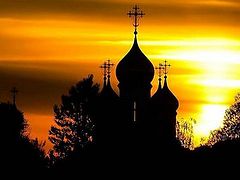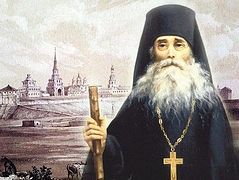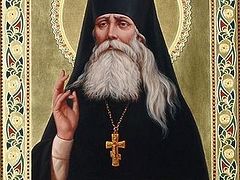 One of the great Optina elders, St. Barsonuphius, in the world named Pavel Ivanovich Plikhankov, was an army colonel before he joined Optina Monastery. He descended from the Orenburg Cossacks, and so the military life was in his blood. Everyone around him knew him to be a just, and pious officer, who regularly attended church services and was well read in spiritual literature. But not even he knew as a young officer that he would be a priest of the Church. Although, to be more exact, St. John of Kronstadt knew.
One of the great Optina elders, St. Barsonuphius, in the world named Pavel Ivanovich Plikhankov, was an army colonel before he joined Optina Monastery. He descended from the Orenburg Cossacks, and so the military life was in his blood. Everyone around him knew him to be a just, and pious officer, who regularly attended church services and was well read in spiritual literature. But not even he knew as a young officer that he would be a priest of the Church. Although, to be more exact, St. John of Kronstadt knew.
“When I was still an officer I had to go to Moscow on business. At the train station I learned that Fr. John was serving Liturgy in a church in one of the military buildings. I went there straightway. When I entered the church the Liturgy had already ended. I went into the altar. At that moment Fr. John was transferring the Holy Gifts from the altar table to the table of oblation. After setting the chalice down, he suddenly came up to me, kissed my hand, and without saying anything walked away again to the altar table. All who were present exchanged glances and later said that this signified some kind of event in my life, and decided that I would be a priest. I laughed at them, since I had no thought at all of becoming a priest. And now you see how inscrutable the ways of God are—I’m not only a priest, but even a monk.” As we know, he not only became a priest and a monk, but a clairvoyant elder.
 Elder Ambrose of Optina Colonel Plikhankov visited Elder Ambrose in Optina to ask his advice about joining a monastery. Elder Ambrose told him that he must serve in the military another two years until he can officially retire on a pension. In the meantime, he was to use his large salary to make donations to churches and monasteries, a specific list of which the elder provided. At the end of those two years he was to return to Elder Ambrose—that is to the Optina Skete of St. John the Forerunner, where he would begin his monastic life. When the time had come to leave the world, Colonel Plekhanov suddenly encountered various obstacles—his pay was held up and he was unable to settle all his financial accounts. Elder Barnabas of the Gethsamene Skete of the Holy Trinity-St. Serguis Lavra helped him find benefactors to pay off these bills, and he was finally freed to become a monk in the Optina Skete.
Elder Ambrose of Optina Colonel Plikhankov visited Elder Ambrose in Optina to ask his advice about joining a monastery. Elder Ambrose told him that he must serve in the military another two years until he can officially retire on a pension. In the meantime, he was to use his large salary to make donations to churches and monasteries, a specific list of which the elder provided. At the end of those two years he was to return to Elder Ambrose—that is to the Optina Skete of St. John the Forerunner, where he would begin his monastic life. When the time had come to leave the world, Colonel Plekhanov suddenly encountered various obstacles—his pay was held up and he was unable to settle all his financial accounts. Elder Barnabas of the Gethsamene Skete of the Holy Trinity-St. Serguis Lavra helped him find benefactors to pay off these bills, and he was finally freed to become a monk in the Optina Skete.
Fr. Barsanuphius was under Elder Ambrose’s spiritual guidance until the elder’s repose. The elder’s successor, Elder Anatoly (Zertsalov), gave him the obedience of cell attendant to Elder Nektary, Elder Ambrose’s close disciple and one of the last Optina Elders. During the next ten years Fr. Barsanuphius, under Elder Nektary’s guidance, became experienced in monastic life, received the tonsure, and ordination into the priesthood.
When the Russo-Japanese war began, Fr. Barsanuphius was sent to the Far-Eastern front as a chaplain for a field hospital dedicated to St. Seraphim of Sarov. Hieromonk Barsanuphius wrote letters from the Front describing his life as an army chaplain.
“Preserved by divine grace and protected by your holy prayers and archpastoral blessing,” he wrote to Bishop Benjamin of Kaluga, “all of us, five hieromonks, safely arrived on May 2, in the city of Harbin, and we await directions for our further assignments from the main quarters in Liaoyan…”
“The sight of Russian churches at the stations of the Siberian railroad comforted us. There was wilderness all around. But then there would be a church, and around would be grouped a few, two or three dozen small houses. Holy Russia in miniature. One’s soul feels radiant and joyful…”1
The Elder later recalled his travels as a chaplain to the Far East. “When I was traveling across Siberia to Mullin, I looked throught the window of the railroad car and thought—there to the east begin unknown countries: China, Korea—countries foreign to us, with their own customs, their own ways. Previously these countries wallowed in the darkness of paganism, and now they’re being enlightened by the Light of Christ. And in the capital of Japan, Tokyo, where they formerly worshipped a dragon, a magnificent church is being erected, an orthodox cathedral. And then, from these unknown countries, my thoughts drifted further, to that country where the inhabitants of heaven live in a state of bliss, where there is neither sorrow nor sighing.”
In another letter from the Far East, after arriving in the town of Mullin, he wrote, “It was just as if I had landed in paradise. There was nature, for all it was worth… Between myself and those around me there was formed a simple, amiable relationship. The head doctor turned out to be a Ukrainian and all the others were real Russian people and believers, among whom of course, were the nurses [who would continue to write to the elder even after the war]. I felt fine there.”
The hospital where he was based was a department of the Red Cross brotherhood founded in the name of Bishop Pitirim of Tambov, who would later be glorified as a saint. “I happened to find and image of the holy hierarch four years ago in our monastery bookstore. I acquired it and set it in a frame, and with the blessing of Fr. Joseph placed it in the skete trapeza, where it is probably located even now. And now I, the unworthy one, have been vouchsafed to serve in a brotherhood named after this holy hierarch, its protector. Now the hospital is filled with sick and wounded brought in from the field of battle, from somewhere near Liaoyan. Some are discharged and head back to the army, while in place of those that are killed new ones arrive. There are up to 250 men in the hospital now, and another hundred are expected. The available medical personnel are not numerous: five doctors, fifteen nurses and twenty orderlies. There is enough work for everyone, and the nurses get it in particular—ceaseless work goes on both night and day. Their care [for the wounded] is good. I have to confess the wounded and commune them with the Holy Mysteries, and comfort them spiritually, as the Lord gives me understanding.
“Only now that I have encountered the wounded Russian officers and soldiers face to face have I been convinced of what an abyss of Christian love and selflessness is contained in the heart of a Russian; and nowhere, perhaps, do they manifest it with such astonishing power and greatness as on the field of battle. Only during the hard times of war is it clearly known that the faith of Christ is the breath and life of the Russian people, and that with the loss and dissipation of this faith in the heart of a nation, its life in inevitably cut short. For each nation there is posed some task or another, which constitutes its existence the content of its life. But the Russian nation has one task, which is rooted in the depths of its soul. This is the eternal salvation of its soul, the inheriting of eternal life, the Kingdom of Heaven…
“I spend the greater part of my time in the Red Cross hospital, and am occasionally tired—not from work, but from the heat…
“I believe, together with all Russian Orthodox people, that the incomprehensible, divine power of the Honorable and Life-Giving Cross will conquer and overwhelm the dark power of the abysmal serpent-dragon that decorates the Japanese banners.”
“I am quite alone here; there is no one with whom to take counsel or converse to the benefit of my wretched soul, though there are many good people around me. The usual course of my life is as follows: I arise at two in the morning and read Morning Prayers, the Midnight Service and First Hour. Then I lie down and arise at six in the morning and read Third and Sixth Hours and Typica. I have tea with bread. Then domestic work and work in the hospital, and lunch at the Red Cross… I rest for an hour, and then again to the hospital. At ten in the evening I read Evening Prayers and Ninth Hour and lie down to sleep. I replace the Hours with the Jesus prayer. I have almost given up the Five-Hundred,2 although I do not lose hope that with God’s help I will again begin and do it all, as I ought. In general, I have not lost touch with much of the Optina order… Many of my colleagues soar and glide high in the heavens like swallows, falcons, and even eagles, but I cannot even lift myself us from the earth, and am weighed down by the sleep of despondency. But I do not lose faith that, perhaps, the Lord will return me to the Skete, and I will shut myself in my silent cell and meditate only on the salvation of my own sinful, wretched soul. But when this time will come is known to God alone…”
Back in the Skete, Fr. Barsuphius shared, “Every day they brought in a great number of wounded and I, as the Lord helped me, comforted them. Those that were dying I united with Christ through Communion of the Holy Mysteries. It often happened that you would approach some patient whose stomach was punctured and whose arm or leg was splintered was splintered—you’d approach him and he’d be suffering, no so much from the pain as from the recollection of his family. He would have a wife and small children who were awaiting return of their daddy, but daddy was lying in the hospital with an incurable wound. You’d have to have a heart of stone to pass by such a sufferer.”3
Russia did not win that war, which ended in 1904, but as historian S.S. Oldenburg wrote, “Not all had been lost. Japan had felt the might of Russia at the very moment when it was ready to reap the fruits of its successes. Russia remained a great Asian power, which would not have been the case if she, to avoid war, had faintheartedly retreated before Japanese importunities in 1903. The sacrifices made were not in vain. For long years to come, Japan, debilitated by the fighting to a far greater degree than Russia, was unable to resume its forward motion in Asia…”4
Elder Barsonuphius’s return from the Far East was fraught with danger and he could have died several times had the Lord not saved him. Wanting to lean against a door on the train, an invisible power prevented him—the door was unlocked and he would have fallen out of the train at high speed. Another time he felt a premonition to not board a train, and that train was wrecked, with many causalities. Another time he was saved from a murder attempt. “The Lord miraculously saved him from all these dangers, and perhaps from many others which he did not notice,” wrote Fr. Nikon of Optina. But finally, with the Jesus prayer constantly on his lips, Elder Barsanuphius arrived at his beloved Optina Skete—the mere remembrance of which strengthened him in all difficulties and despondency far from home, in the midst of the wounds and woes of war.
From the book, Elder Barsanuphius of Optina







